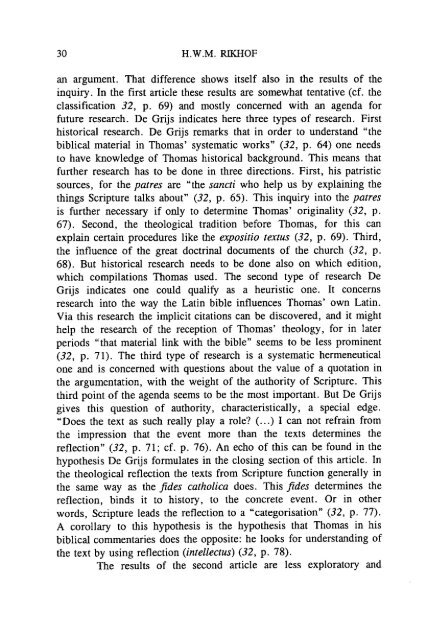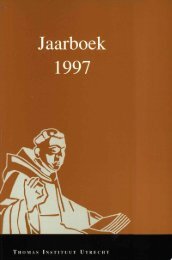Jaarboek Thomas Instituut 1995 - Thomas Instituut te Utrecht
Jaarboek Thomas Instituut 1995 - Thomas Instituut te Utrecht
Jaarboek Thomas Instituut 1995 - Thomas Instituut te Utrecht
You also want an ePaper? Increase the reach of your titles
YUMPU automatically turns print PDFs into web optimized ePapers that Google loves.
30 H.W.M. RIKHOF<br />
an argument. That difference shows itself also in the results of the<br />
inquiry. In the first article these results are somewhat <strong>te</strong>ntative (cf. the<br />
classification 32, p. 69) and mostly concerned with an agenda for<br />
future research. De Grijs indica<strong>te</strong>s here three types of research. First<br />
historical research. De Grijs remarks that in order to understand "the<br />
biblical ma<strong>te</strong>rial in <strong>Thomas</strong>' sys<strong>te</strong>matic works" (32, p. 64) one needs<br />
to have knowledge of <strong>Thomas</strong> historical background. This means that<br />
further research has to be done in three directions. First, his patristic<br />
sources, for the patres are "the sancti who help us by explaining the<br />
things Scripture talks about" (32, p. 65). This inquiry into the patres<br />
is further necessary if only to de<strong>te</strong>rmine <strong>Thomas</strong>' originality (32, p.<br />
67). Second, the theological tradition before <strong>Thomas</strong>, for this can<br />
explain certain procedures like the expositio <strong>te</strong>xtus (32, p. 69). Third,<br />
the influence of the great doctrinal documents of the church (32, p.<br />
68). But historical research needs to be done also on which edition,<br />
which compilations <strong>Thomas</strong> used. The second type of research De<br />
Grijs indica<strong>te</strong>s one could qualify as a heuristic one. It concerns<br />
research into the way the Latin bible influences <strong>Thomas</strong>' own Latin.<br />
Via this research the implicit citations can be discovered, and it might<br />
help the research of the reception of <strong>Thomas</strong>' theology, for in la<strong>te</strong>r<br />
periods "that ma<strong>te</strong>rial link with the bible" seems to be less prominent<br />
(32, p. 71). The third type of research is a sys<strong>te</strong>matic hermeneutical<br />
one and is concerned with questions about the value of a quotation in<br />
the argumentation, with the weight of the authority of Scripture. This<br />
third point of the agenda seems to be the most important. But De Grijs<br />
gives this question of authority, charac<strong>te</strong>ristically, a special edge.<br />
"Does the <strong>te</strong>xt as such really playa role? (... ) I can not refrain from<br />
the impression that the event more than the <strong>te</strong>xts de<strong>te</strong>rmines the<br />
reflection" (32, p. 71; cf. p. 76). An echo of this can be found in the<br />
hypothesis De Grijs formula<strong>te</strong>s in the closing section of this article. In<br />
the theological reflection the <strong>te</strong>xts from Scripture function generally in<br />
the same way as the fides eathoLiea does. This fides de<strong>te</strong>rmines the<br />
reflection, binds it to history, to the concre<strong>te</strong> event. Or in other<br />
words, Scripture leads the reflection to a "ca<strong>te</strong>gorisation" (32, p. 77).<br />
A corollary to this hypothesis is the hypothesis that <strong>Thomas</strong> in his<br />
biblical commentaries does the opposi<strong>te</strong>: he looks for understanding of<br />
the <strong>te</strong>xt by using reflection (in<strong>te</strong>Llectus)(32, p. 78).<br />
The results of the second article are less exploratory and








